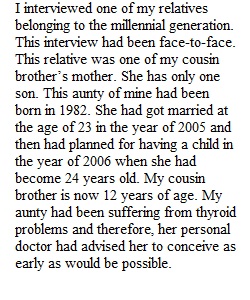


Q For this discussion board you are going to do two short interviews with women about children and family planning since we are talking about fertility this week. These can be over the phone or face-to-face. They can be with people you know well, or people you do not know well. I want you to find one woman who is from the "Greatest Generation" (e.g., born about 1910 to 1924) and one Millennial woman (e.g., born about 1982-2004). I understand it might be harder for you to find the older woman, so I am flexible with their age (as long as you interview someone who is older than the Millennial woman and considered to be part of a different generation, e.g., a Baby Boomer or from Generation X). ***First, please note that this can be a very sensitive topic for women/people for a number of reasons (e.g., infertility, child/pregnancy loss, etc.). Make sure that whomever you talk to about this is comfortable and aware that you are only using it for class and will not reveal their identity to the class. This is also a relatively personal topic, so be aware that you may become uncomfortable too and that people may not want to share with you everything (and tell them that is fine!). Please ask them about: 1) how many children they had or plan to have and when (e.g., the age at which they planned to or did have the children), 2) why or how they made the decisions they did about the number of children and when they had them, and 3) what they think influenced them in determining the size and timing of their families. You can record the interviews (for many smartphones you can download free apps to do so, just Google it and make sure to ask permission) or take notes. Then write up a short summary of what you found for your discussion post as well as consider and discuss the differences between the two and why you see (or don't see) the differences between the number and timing of children for both. Also, discuss how your findings do or do not match up with some of the fertility trends discussed in the Week's textbook. Because I realize this is time intensive, I will not mark initial posts that are done on Friday as late. I look forward to seeing what you find and whether it confirms what we have learned about with regards to fertility trends.
View Related Questions